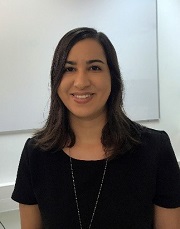 Ayelet was born and raised in Ma’alot, a small town in northern
Israel. She studied at the Tefen Democratic School, where she concentrated on
mathematics, biology and psychology. During her high school years, Ayelet
volunteered in Magen David Adom and at a center caring for individuals with special
needs. After graduating high school, she volunteered for a year in Safed, working
with youths from a low socio-economic background. She served in the army for
two and a half years in the Air Force Traffic Control Unit.
Ayelet was born and raised in Ma’alot, a small town in northern
Israel. She studied at the Tefen Democratic School, where she concentrated on
mathematics, biology and psychology. During her high school years, Ayelet
volunteered in Magen David Adom and at a center caring for individuals with special
needs. After graduating high school, she volunteered for a year in Safed, working
with youths from a low socio-economic background. She served in the army for
two and a half years in the Air Force Traffic Control Unit.
In 2009, Ayelet began her BSc in Biomedical Engineering at Ben-Gurion
University of the Negev. In her final year, Ayelet began working as a research
assistant in the laboratory of Prof. Ilan Dinstein, in the Psychology Department.
During that year, Ayelet developed advanced algorithms for analyzing EEG
activity recorded from individuals with autism, in an attempt to uncover the
unique sensory processing that characterizes such individuals. Working in a
research lab specializing in neuroimaging and computational neuroscience motivated
Ayelet to pursue graduate studies in the Department of Brain & Cognitive
Sciences at Ben-Gurion University. She completed her master’s degree summa cum laude and continued
to a PhD in the same department, all under Prof. Dinstein’s supervision.
Ayelet’s research focuses on the reliability of neural responses.
Using neuroimaging techniques such as EEG and fMRI, Ayelet has shown that the
neural activity of the human brain varies dramatically across trials and over
time, even when the same sensory stimuli are presented repeatedly. This brain
variability is tightly related to cognitive function and behavior and is found
to be greater in humans with neurodevelopmental disorders such as ADHD and autism.
Ayelet found that neural variability is a stable human trait that
constrains individual perceptual abilities and cognitive performances, though
it can be slightly altered by means of flexible cognitive mechanisms such as
allocating attention.
Alongside her principal research, Ayelet has conducted two projects
at the National Center for Autism Research at Ben--urion University. In the
first, she examined sleep disturbances in children with autism and uncovered an
impaired sleep mechanism that may underlie the high prevalence of sleep disorders
in this population. In the second, she is analyzing brain MRI scans of toddlers
with autism in an effort to identify early brain abnormalities.
In the fall of 2020, Ayelet will begin her postdoctoral training in
the laboratory of Prof. Tobias Donner at the University Medical Center
Hamburg-Eppendorf in Hamburg, Germany. Alongside
her principal research, Ayelet has conducted two projects at the National
Center for Autism Research at Ben Gurion University. In the first, she examined
sleep disturbances in children with autism and uncovered an impaired sleep
mechanism that may underlie the high prevalence of sleep disorders in this
population. In the second, she is analyzing brain MRI scans of toddlers with
autism in an effort to identify early brain abnormalities.
During her PhD studies, Ayelet was awarded the Ben Gurion University of the Negev
fellowship for outstanding students, and the prestigious Adams fellowship of
the Israel Academy of Sciences and Humanities. She has published several papers
as a first author and presented her research at a number of national and
international scientific conferences.
In the fall of 2020, Ayelet will begin her postdoctoral training in the
laboratory of Prof. Tobias Donner at the University Medical Center
Hamburg-Eppendorf in Hamburg, Germany. During that time, Ayelet will explore
the neural bases of decision-making processes, and specifically how previous
choices bias current decisions, using advanced computational models for neural
and behavioral data in humans.